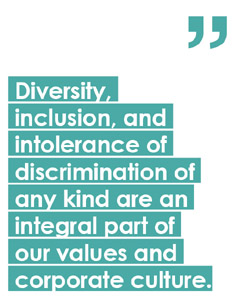These are changes driven by the high expectations associated with business performance, increasing shareholder demands, and increased customer and public interest in transparency and business integrity. Experience has led to the formulation of certain principles, such as the OECD Guidelines on Corporate Governance of State-Owned Enterprises or the OECD Principles of Corporate Governance. In Slovakia, the Slovak Association of Corporate Governance has issued a Code of administration for companies with state ownership. Taking these principles into account, we are also implementing reporting at SPP, as we are convinced that this will help us realize our potential and set a good example through transparent governance.
SPP Code of Conduct
In June of this year, SPP adopted a new SPP Code of Conduct, which also applies to its subsidiaries SPP CNG and SPP CZ. It is a comprehensive document that regulates the rules of expected behavior of the company’s management, supervisory bodies, employees, and the contractual partners of SPP, as well as the principles of responsible business conduct. As part of our corporate culture, it is intended to help create an atmosphere of mutual respect, decency, and belonging. It is the backbone document of the compliance program and, in a broader framework, part of corporate governance. The mission of the SPP Code of Conduct is not just to set rules or provide answers. Compliance is an area responsive to changing legislation, developments, and the needs of the company.
Compliance program
In addition to the SPP Code of Conduct itself, the SPP compliance program consists of a series of follow-up internal guidelines and other tools for the compliance manager to understand and comply with operational and ethical-moral principles and rules. SPP has a designated compliance manager who is independent of other activities and can report directly to the board of directors and the chief executive officer. Compliance, together with the areas of internal audit and risk management, constitute a complementary internal control system for SPP. SPP conducts business in a regulated sector. Compliance with legislation is therefore a prerequisite for responsible business conduct and affects the reputation of the company, but now there is a need for action in other areas.
Internal relations
Employees are the company’s greatest asset, and this important fact is recognized and reflected in how the company interacts with and motivates employees. SPP’s relations with its employees and the relations between employees at all levels are based on respect for the dignity of every human being and with respect for fundamental human rights. We fully respect the freedom and equality of all people, regardless of their race, origin, color, sex, language, religion, political or other opinion, family, or any other status. Diversity, inclusion, and intolerance of discrimination of any kind are an integral part of our values and corporate culture.
The SPP Code of Conduct is intended to encourage open and transparent debate both within SPP and externally. Ruth Bader Ginsburg, who served as an associate justice of the U.S. Supreme Court said: “People ask me sometimes... ‘When will there be enough women on the court?’ And my answer is, ‘When there are nine.’ People are shocked. But there’d been nine men, and nobody’s ever raised a question about that.” Try to think for a moment, how you would feel if all the members of the top body in your company were women? How would you improve equality for all people in your company?

External relations
Compliance, undoubtedly, has a monitoring, preventive, and educational function. However, it can also support business and contribute to transparent and sustainable business. A modern company can share its success, and this is what our business partners expect from us. Increasingly, larger customers in particular, are conducting detailed assessments of, for example, how SPP complies with the prohibition of any discrimination, what activities it undertakes in the areas of social responsibility, environmental protection, transparent and sustainable business, prevention of money laundering, or how it ensures the protection and integrity of its information systems and personal data, when selecting their energy supplier.
Anti-corruption and whistleblowing
SPP has set out the rules of its anti-corruption policy, including how to deal with acceptable small gifts, including advertising and promotional items, because the line between acceptable and unacceptable gifts is often ambiguous in practice. Factors we consider when assessing whether a gift may be acceptable include that the gift must not be solicited or coerced, be given in the context of a standard business relationship on an occasional basis without any expectation of favor, not damage the reputation of the employee or SPP, not influence or bind the recipient, and not be worth more than 100 Euro.
SPP has introduced a system for sending complaints, either electronically or in writing addressed to the compliance manager. If anyone encounters a situation or behavior that they believe in good faith to be inconsistent with the SPP Code of Conduct, our values, or to constitute anti-social activity, such as conflicts of interest, corruption, or serious administrative offences such as breaches of competition rules, they may contact the compliance manager at any time.
We believe that knowing, understanding, and adhering to the principles and standards of conduct set out in the SPP Code of Conduct and our values is fundamental to building good relations and trust between us, our customers, suppliers, employees, shareholders, and society.
Alojz Jankó, Director of Regulation and Compliance, SPP



Follow us